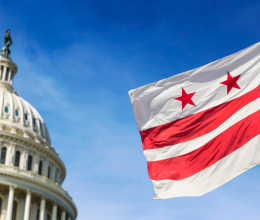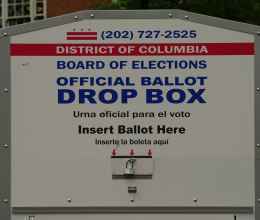Many people understand that depriving Washington, D.C. of statehood is immoral and unjust. It harms our democracy. And the problems don't stop there: Congressional control over D.C.’s budget and overreach into D.C.’s local policies has caused harm by depriving D.C. residents of hundreds of millions of dollars in critical programs.
Here are some recent examples:
Blocked Marijuana Sales
In March, Congress passed the FY 2022 omnibus federal spending bill, which includes a prohibition against the sale of marijuana for recreational use in D.C. However, residents of D.C. approved the sale of recreational marijuana via a ballot initiative in 2015. Congress has used its power over the District to suppress the will of the people here for seven years running.
As of April 2021, eleven U.S. states charge taxes on legal marijuana sales. Through these sales, these states generate tens to hundreds of millions of dollars in revenue for their state governments annually. Here is a breakdown of tax revenue collected by eight states in 2020 alone:
- California – $1 billion
- Washington State – $474 million
- Colorado – $387 million
- Oregon – $158 million
- Nevada – $105 million
- Massachusetts – $82 million
- Illinois – $53 million
- Alaska – $24 million
By any calculation, Congress’s ongoing insistence on denying D.C. residents the ability to create our own laws is costing the District millions and millions in tax revenue.
Less Funding in the 2022 Appropriations Bill
The FY 2022 omnibus funding bill was the first time in more than a decade where Congressional delegations could request funding for their districts and states. No small amount of funding is up for grabs: the 2022 federal budget includes over half a billion dollars of “congressionally directed spending,” which is allocated by members of Congress based on requests. Senators typically secure greater amounts as they face no restrictions on their requests. House members are capped at requesting funding for no more than 10 projects in total.
The biggest “winner” for earmarked funds in 2022 is Sen. Richard C. Shelby (R-AL) who secured $548 million for his home state – but of note, every other member of the House or Senate who requested earmarked funds received all or some of their requests.
Representative Norton reported that D.C. was shortchanged an estimated $90–200 million in earmarked funds from the federal government this year alone because D.C. does not have two voting senators.
As Rep. Holmes Norton concluded: “This unequal treatment is particularly egregious because D.C. residents pay the same federal taxes as residents of states.”
Denied Funding from the 2020 CARES Act
At the onset of the COVID-19 pandemic in 2020, Congress passed a stimulus bill that provided every U.S. state with $1.25 billion in aid, but Congress chose to treat the District of Columbia as a territory and provide D.C. with less than half that funding. Usually Congress treats Washington, D.C. in the same manner as states when it comes to federal financial assistance, such as federal grants, Medicare reimbursement, and funding for highways, education, and food assistance. At the time, D.C. had more confirmed COVID-19 cases than 19 states. Even during a public health crisis, D.C. was shortchanged by Congress but lacked the voting representation to advocate for our residents.
Getting the support D.C. residents need should not be subject to the whims of politicians who don’t represent D.C. In just the last several years, lack of statehood and full voting representation in Congress has deprived D.C. of hundreds of millions of dollars that could have been spent on addressing our most pressing concerns, including supporting public education, advancing housing needs, and fighting structural inequality across the District.
The only way to ensure the 690,000 people of the District have the same rights as Americans in every other state is through statehood.
Learn more and take action at dcstatehoodnow.org



